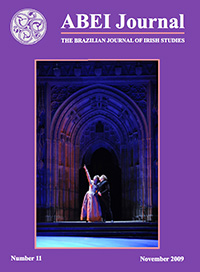Irish Neutrality: Louis MacNeice’s Poetic Politics at the Outset of “The Emergency”
DOI:
https://doi.org/10.37389/abei.v11i0.3656Palavras-chave:
Ireland, Second World War, Louis MacNeice’.Resumo
This article builds upon previous scholarship attuned to Ireland’s
complex position as a neutral state during the Second World War (“The
Emergency”), and which points out Louis MacNeice’s hostility towards the Irish government’s official stance. It does so by looking at “The Closing Album” as a political lyric critiquing Irish neutrality’s isolation0
ist and damaging effects and shows how the poem – in the act of critiquing neutrality – asserts the modern poet’s position as an emotionally invested political spokesman. I argue that the nation’s political goals were irreconcilable with postcolonial artistic aims: Irish writers were intent on constructing an image of Irishness that was not dictated by British coloring and was exportable through the medium of their art, while the government aimed at becoming a self-sufficient,
sovereign nation. This split between politician and artist during The Emergency ushers in a modern Irish poetry that is at once political and aesthetic.


